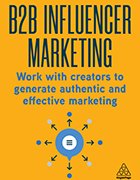Influencer marketing best practices for B2B brands
Influencer marketing can help B2B brands engage audiences across the entire marketing funnel. Best practices include setting goals and tailoring content for specific funnel stages.
Marketers and influencers can complement each other perfectly: One brings professional marketing knowledge, while the other brings audience trust and authentic engagement.
Social media platforms, like LinkedIn, Instagram and TikTok, have led to the rise of influencer marketing, which is the strategic partnership between content creators and brands to promote products and services. While B2C brands popularized this approach, it can also help B2B brands across all stages of the marketing funnel. Yet, most brands limit themselves to top-of-funnel activities, such as generating brand awareness, said Nick Bennett, B2B marketer, content creator and bestselling author.
"Out of all the companies that are doing influencer marketing today in B2B, I would say at least 95% are probably stuck at that top-of-funnel [stage]," Bennett said.
In his book, B2B Influencer Marketing: Work with creators to generate authentic and effective marketing, Bennett challenges brands to view influencer marketing as a full-funnel activity. He suggested brands both build awareness and engage audiences throughout the consideration and purchase phases of the customer journey.
In Chapter 5, "Crafting your influencer marketing campaign," Bennett suggested marketers use the following steps to achieve a full-funnel influencer marketing strategy:
- Step 1: Set clear campaign goals. Brands must identify which goals, such as increased website traffic or brand awareness, they want the campaign to achieve. This can help them choose the right influencers and content types.
- Step 2: Identify your target audience. Create buyer personas that include demographics, psychographics, pain points and online behaviors.
- Step 3: Identify and reach out to influencers. Find partners that create high-quality content, have an engaged following and share a target audience with the brand. Personalize outreach to these creators, and make the pitch about them -- not the brand.
- Step 4: Identify the type of content you'll create. Tailor content for different funnel stages. Social media takeovers and webinars work well for building brand awareness, whereas workshops and testimonials nurture relationships with customers in the consideration phase.
Step four is at the core of Chapter 5. It walks readers through specific content types for each stage in the marketing funnel, from interactive webinars at the top to personalized product demos and customer success stories at the bottom.
To learn more about B2B Influencer Marketing, read the following excerpt of Chapter 5, "Craft your influencer marketing campaign." Visit the Kogan Page site to learn more about the book.
Step four: Identify the type of content you'll create
Now that the groundwork has been laid, it's time to start to identify what exactly you'll be creating with your influencer partners. The best way to accomplish this step is identifying which stage of the funnel you'll be looking to target as this will inform content type.
ToFu: Generating awareness and cultivating interest
Before we dive into specifics, let's start with a story. I call it "How not to do a top-of-the-funnel campaign."
One time, a B2B SaaS platform approached me about an influencer campaign they hoped we'd participate in. Their ask wasn't unreasonable -- three posts for a fair exchange in value.
I said no. Why? Three posts weren't going to accomplish their goal of aligning their brand with the top revenue-generating leaders in the industry.
So, we countered with a far more ambitious idea, including joint presentations by TACK and this organization, creating a co-branded asset, and there were a few LinkedIn posts as well.
Our plan was still about driving that awareness. Still, instead of being a few posts within an ocean of content on LinkedIn, it was centered around this event series that would provide value without too much of an ask on the audience.
And that's exactly what ToFu content should do. It's time to go beyond "sponcon."
Yes, sponsored content (sponcon) has its place. However, the early stages of broadening your brand's awareness demand a more nuanced approach. At the ToFu, we have the opportunity to redefine what influencer marketing can be—moving beyond mere transactions to foster authentic engagements.
Influencer marketing isn't just a new kind of paid ad. It's time we shift our focus from short-term gains to long-term relationships. This means finding influencers who align with your brand's values and are genuinely interested in your products or services. These influencers will naturally create quality content and foster meaningful discussions with their followers about your brand. Here are some campaign ideas for ToFu.
Takeovers that tell a story
We've all seen social media takeovers, and they're popular for a reason: They work.
As with any tactic, though, the more brands lean on it, the noisier it becomes. Over time, it's become a barrage of influencers shuffling between brands, and keeping track of who represents what is hard.
Instead of having a shared narrative that resonates with your audience, you have a long-lasting story to tell. Let's use a for instance.
A short-term rental platform wants to draw more attention to how it can help people rent out their property on VRBO or Airbnb.
Instead of having influencers in the space take over social media, companies can focus on telling memorable industry stories like the worst guests they've ever had. This approach is relatable, speaks to the ICP, and gives your audience a reason to engage and follow along.
Things to consider:
- Choose the right influencers: They're representing your brand and literally posting under your account.
- Have a clear call to action: Too many social media takeovers will have just the right combo of everything above… but people aren't sure what to do next. Make sure every aspect of this effort is clear.
- Encourage real-time interaction: Don't just post it and forget it. Have any influencer(s) involved stick around and engage. Not only does the algorithm love it, it'll also make the whole process more effective.
Interactive content collaborations
We've also seen far too often in the market content/campaigns that simply speak at your audience rather than to them. This is completely contrary to everything people-first.
Community is built through engagement. So, engage your audience (and future customers) by involving them in the content creation process. Instead of giving your influencers the exact messaging you want them to use, collaborate with them and host contests, polls, or challenges related to your brand.
This will do everything you expect (not only create excitement and buzz around your brand) but also allow for direct interaction with potential customers.
Maybe you work with the influencer to invite their followers to create along with you or share their stories. Your audience will feel included and valued, and most importantly, they'll remember the experience because of the stronger connection with your brand.
Things to consider:
- Keep your goals firmly in mind: The type of interactivity you decide upon needs to be aligned with your goals.
- Encourage UGC: Perhaps your influencer is the tip of the iceberg for a whole bunch more content created by their followers. UGC is a great way to create a flywheel effect where content creates even more content.
- Use the strength of your platform: Not all platforms are created equal. Influencer marketing in B2B doesn't live or die by LinkedIn. Driving users to platforms that allow for better engagement can be the way to go if you feel constrained.
Webinars that educate AND entertain
Repeat after me: webinars aren't dead. Boring content is dead. Now, say it 10 more times until you start to believe it.
Yes, there are far, far too many events we've been to that have amounted to a bunch of talking heads on a Zoom screen and, if you're lucky, a 10-minute Q&A at the end.
No matter how great the content may be, lacking engagement, interaction, and fun will lead to low performance. It's easy to hide behind a slide deck and sail through bullet points. Plus, your audience knows that webinars are recorded and slide decks are typically shared after the fact, so they can become disengaged.
From the content perspective, one way to avoid this is a litmus test: If you do the dry run and you find yourself a little bored, your audience would have checked out far before you.
Whether it's taking a look at industry trends or a workshop on using your product, the right influencer can transform educational webinar content into something both informative and enjoyable:
- Lead with your best content: Don't leave your best for last. Put your best up first otherwise you'll lose attendees' attention real quick.
- Avoid the disguised sales pitch: You might think you're doing a soft sell, but people are so allergic to being sold to that if your webinar has even a hint of selling in it, people will have a negative reaction and it will make it that much harder for you to create real engagement with them. So, don't do that.
- Drive interaction: interaction doesn't happen by accident. Ensure you've got people and questions and polls seeded throughout to keep your audience engaged.
Editor's note: This edited extract is from B2B Influencer Marketing by Nick Bennett ©2024 and is reproduced and adapted with permission from Kogan Page Ltd.
Tim Murphy is site editor for Informa TechTarget's SearchCustomerExperience and SearchContentManagement sites.






